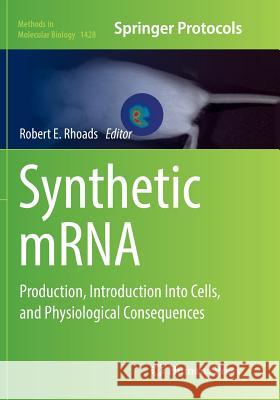Synthetic Mrna: Production, Introduction Into Cells, and Physiological Consequences » książka
topmenu
Synthetic Mrna: Production, Introduction Into Cells, and Physiological Consequences
ISBN-13: 9781493980987 / Angielski / Miękka / 2018 / 320 str.
Kategorie BISAC:
Wydawca:
Humana Press
Seria wydawnicza:
Język:
Angielski
ISBN-13:
9781493980987
Rok wydania:
2018
Wydanie:
Softcover Repri
Ilość stron:
320
Waga:
0.58 kg
Wymiary:
25.4 x 17.78 x 1.78
Oprawa:
Miękka
Wolumenów:
01
Dodatkowe informacje:
Wydanie ilustrowane











